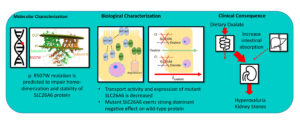Nephrolithiasis results from interaction between genetic and environmental factors. Calcium oxalate is the most common type of kidney stone. We report a novel genetic mechanism causing hyperoxaluria and nephrolithiasis. In one family, we detected a mutation within the SLC26A6 gene that encodes an oxalate transporter. This mutation impairs SLC26A6 function, which normally secretes oxalate in the intestine and thereby limits net absorption of dietary oxalate. Impaired SLC26A6 function therefore increases oxalate excretion into urine, promoting the development of kidney stones. Functional testing demonstrated that the mutated protein also has a dominant negative effect to impair the expression of the normal protein. Importantly, excessive oxalate absorption was reduced by increasing dietary calcium, resulting in correction of hyperoxaluria. Thus, identification of this mutation allowed an effective personalized therapeutic approach. (Prof D Eladari on behalf of all co-authors, https://jmg.bmj.com/content/early/2022/02/03/jmedgenet-2021-108256 )
Dominant negative mutation in oxalate transporter SLC26A6 associated with enteric hyperoxaluria and nephrolithiasis
(Visited 275 times, 1 visits today)
